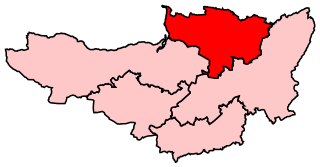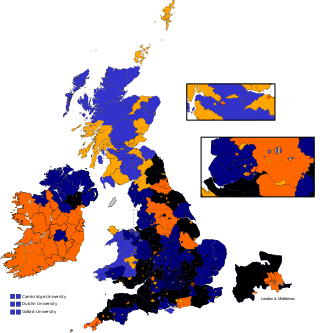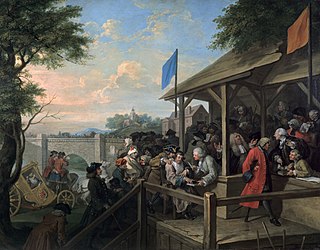Members of Parliament
MPs 1290–1629
- Constituency created (1290)
| Somerset | |
|---|---|
| Former county constituency for the House of Commons | |
| County | Somerset |
| 1290–1832 | |
| Seats | Two |
| Replaced by | East Somerset and West Somerset |
Somerset was a parliamentary constituency in Somerset, which returned two Members of Parliament (MPs), known traditionally as knights of the shire, to the House of Commons of England until 1707, the House of Commons of Great Britain from 1707 to 1800, and the House of Commons of the United Kingdom from 1801 to 1832.
Elections were held by the bloc vote system.

Bridgwater is a parliamentary constituency represented in the House of Commons of the Parliament of the United Kingdom since 2024 by Ashley Fox of the Conservative Party. It elects one Member of Parliament (MP) by the first past the post system of election.

Wells was a constituency in Somerset in the House of Commons of the UK Parliament. Apart from between 2010–2015, Wells was represented by members of the Conservative Party since 1924.
Oxford was a parliamentary constituency in the United Kingdom, comprising the city of Oxford in the county of Oxfordshire.

Abingdon was a parliamentary constituency in England, represented in the House of Commons of the Parliament of England until 1707, then of the Parliament of Great Britain from 1707 to 1800 and of the Parliament of the United Kingdom from 1801 to 1885. It elected one Member of Parliament (MP) from 1558 until 1983, making it one of the few English constituencies in the unreformed House of Commons to elect only one Member of Parliament (MP) by the first past the post system of election.
Morpeth was a constituency centred on the town of Morpeth in Northumberland represented in the House of Commons of the Parliament of England from 1553 to 1707, the Parliament of Great Britain from 1707 to 1800, and then the Parliament of the United Kingdom from 1800 to 1983.
Bedfordshire was a United Kingdom Parliamentary constituency, which elected two Members of Parliament to the House of Commons of England from 1295 until 1707, then the House of Commons of Great Britain until 1801 and the House of Commons of the United Kingdom until 1885 when it was divided into two constituencies under the Redistribution of Seats Act 1885.
Cornwall is a former county constituency covering the county of Cornwall, in the South West of England. It was a constituency of the House of Commons of England then of the House of Commons of Great Britain from 1707 to 1800 and of the House of Commons of the United Kingdom from 1801 to 1832. It was represented by two Knights of the Shire, elected by the bloc vote system.
Hastings was a parliamentary constituency in Sussex. It returned two Members of Parliament to the Parliament of England until 1707, Parliament of Great Britain before 1801 and the House of Commons of the Parliament of the United Kingdom until the 1885 general election, when its representation was reduced to one member. It was abolished for the 1983 general election, when it was partially replaced by the new Hastings and Rye constituency.
Cumberland is a former United Kingdom Parliamentary constituency. It was a constituency of the House of Commons of the Parliament of England then of the Parliament of Great Britain from 1707 to 1800 and of the Parliament of the United Kingdom from 1801 to 1832. It was represented by two Knights of the Shire. It was divided between the constituencies of Cumberland East and Cumberland West in 1832. Mike Jenkinson, Conservative, served as the local MP in Workington from 2019 until the dissolution of parliament in 2024.
Devon was a parliamentary constituency covering the county of Devon in England. It was represented by two Knights of the Shire, in the House of Commons of England until 1707, then of the House of Commons of Great Britain from 1707 to 1800 and finally the House of Commons of the United Kingdom from 1801 to 1832. Elections were held using the bloc vote system of elections.
Malton, also called New Malton, was a constituency of the House of Commons of the Parliament of England in 1295 and 1298, and again from 1640, then of the Parliament of Great Britain from 1707 to 1800 and of the Parliament of the United Kingdom from 1801 to 1885. It was represented by two Members of Parliament until 1868, among them the political philosopher Edmund Burke, and by one member from 1868 to 1885.
Rutland was a parliamentary constituency covering the county of Rutland. It was represented in the House of Commons of the Parliament of the United Kingdom until 1918, when it became part of the Rutland and Stamford constituency, along with Stamford in Lincolnshire. Since 1983, Rutland has formed part of the Rutland and Melton constituency along with Melton Mowbray from Leicestershire.
Sudbury was a parliamentary constituency which was represented in the House of Commons of the Parliament of the United Kingdom.
New Shoreham, sometimes simply called Shoreham, was a parliamentary borough centred on the town of Shoreham-by-Sea in what is now West Sussex. It returned two Members of Parliament (MPs) to the House of Commons of England from 1295 to 1707, then to the House of Commons of Great Britain until 1800, and finally to the House of Commons of the Parliament of the United Kingdom from 1801 until it was abolished by the Redistribution of Seats Act 1885, with effect from the 1885 general election.
Surrey was a constituency of the House of Commons of the Parliament of England, then of the Parliament of Great Britain from 1707 to 1800 and of the Parliament of the United Kingdom from 1801 to 1832. It was represented by two Members of Parliament until 1832.
Andover was the name of a constituency of the House of Commons of the Parliament of England from 1295 to 1307, and again from 1586, then of the Parliament of Great Britain from 1707 to 1800 and of the Parliament of the United Kingdom from 1801 to 1918. It was a parliamentary borough in Hampshire, represented by two Members of Parliament until 1868, and by one member from 1868 to 1885. The name was then transferred to a county constituency electing one MP from 1885 until 1918.
Lyme Regis was a parliamentary borough in Dorset, which elected two Members of Parliament (MPs) to the House of Commons from 1295 until 1832, and then one member from 1832 until 1868, when the borough was abolished.

Dorset was a county constituency covering Dorset in southern England, which elected two Members of Parliament (MPs), traditionally known as knights of the shire, to the House of Commons of England from 1290 until 1707, to the House of Commons of Great Britain from 1707 to 1800, and to the House of Commons of the United Kingdom until 1832.

Oxfordshire was a county constituency of the House of Commons of the Parliament of England then of the Parliament of Great Britain from 1707 to 1800 and of the Parliament of the United Kingdom from 1801 to 1885. It was represented by two Members of Parliament. In 1832 this was increased to three Members of Parliament. The constituency was abolished in 1885, being split into three single member divisions.
Staffordshire was a county constituency of the House of Commons of the Parliament of England then of the Parliament of Great Britain from 1707 to 1800 and of the Parliament of the United Kingdom from 1801 to 1832. It was represented by two Members of Parliament until 1832.